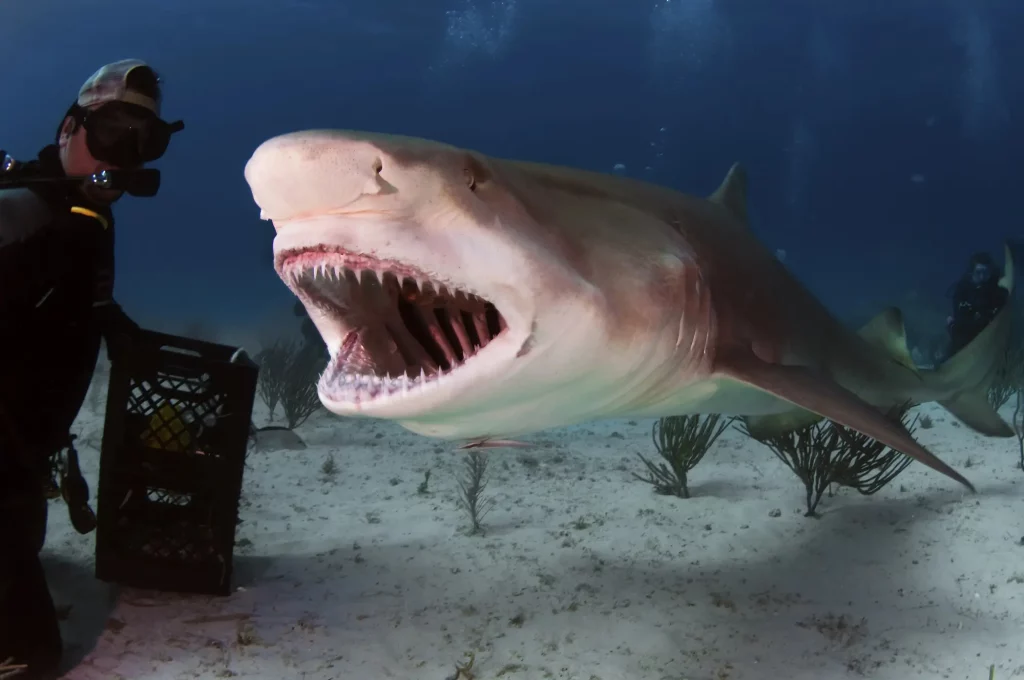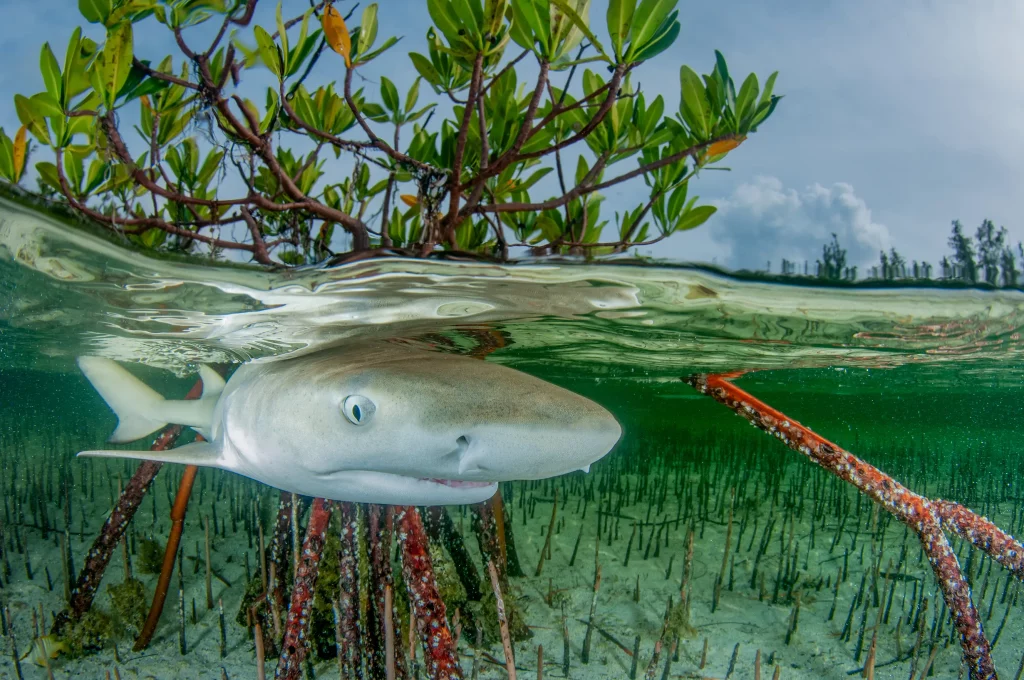Did you know lemon sharks are not considered aggressive and are not known to be a threat to humans? That being said, they are a large predator and humans can be hurt by them if they’re not careful. Read on.
Understanding Lemon Sharks
Lemon sharks are easily identifiable by their two, equally-sized, dorsal fins, and their yellow-brown to olive-green color (hence their name), which allows them to blend into their natural environment easily. They can generally reach about 8-10 feet long and can weigh as much as 400 pounds.
Lemon sharks can live up to 30 years.
Lemon sharks are also known by their scientific name: Negaprion brevirostris (or N. brevirostris for short). Here’s how they’re classified taxonomically (in order of increasing specificity):

Classification of Lemon Shark
Order: Carcharhiniformes
Family: Carcharhinidae
Genus: Negaprion
Species: brevirostris
Lemon Shark Habitat and Distribution
Lemon sharks are found in subtropical shallow waters (~300 ft / 90 m) near coral reefs, sounds, river mouths, and mangroves. They do not venture into freshwater.
They sometimes congregate near docks and fishing piers at night and return to deeper water during the day.
Lemon sharks inhabit coastal inshore waters from New Jersey down to Southern Brazil, the Gulf of Mexico, and the Caribbean. Along the eastern Atlantic, they’re found along Senegal and the Ivory Coast. They’re also seen from the Gulf of California down to Ecuador.

The Diet of Lemon Sharks
Lemon sharks are no picky eaters; crustaceans, rays, cephalopods (i.e. octopus, squid), sea birds, and a variety of bony fish make up their diet.
Although they don’t have many predators, larger lemon sharks do occasionally consume smaller ones, making some individuals cannibalistic.
Lemon sharks tend to feed at random times throughout the day, during which they’re found swimming over sandy or muddy bottoms. They typically eat until they’re full, and have roughly 25-41 hours to fully digest a meal (depending on the food and temperature).
Lemon vs Bull Shark Diet
Here’s a general comparison table between lemon and bull shark diets:
| Lemon Shark | Both | Bull Shark |
|---|---|---|
| Crustaceans | Fish | Sea Turtles |
| Mollusks | Rays | Dolphins |
| Sea Birds | ||
| Other Sharks |
Lemon Shark Hunting Behaviors’ Effect on the Ecosystem
As apex predators (meaning at the top of the food chain with few, if any other, predators), lemon sharks play a significant role in maintaining the balance of their ecosystems. By consuming other species, lemon sharks prevent them from overpopulating, hence regulating their populations (and in turn, those below the food web) and allowing a diverse ecosystem to thrive.
Lemon Shark Behavior and Human Interaction
Lemon sharks are usually docile and aren’t considered aggressive towards humans, presenting little threat, if any. They may, however, become aggressive if provoked, feel threatened, or are protecting their territory or offspring.
Statistically speaking, there’s only been 10 unprovoked attacks by lemon sharks, all occurring in Florida and the Caribbean, none of which were fatal.
When they’re calm (which they usually are) and don’t feel under threat, lemon sharks are quite curious animals and may approach divers willingly. Most interactions between lemon sharks and humans are for ecotourism activities, such as underwater feeding.
When you look online, you can find many videos demonstrating interactions between divers and lemon sharks, each showcasing that not only are the sharks not aggressive, but they can be quite friendly and nice. Once they’ve gotten to know and trust you, they may even come up and greet you, or politely ask for a pat! Some enjoy pats so much that they can even become jealous of other sharks who they think are getting too much attention.
Remember to Stay Cautious
Although lemon sharks aren’t considered a threat to humans, they do inhabit coastal waters, such as shallow coral reefs, that are often popular visiting spots for swimmers, surfers, and divers. Therefore, it’s important to remember to be cautious and keep your distance so that you don’t accidentally startle any sharks. They are wild animals after all and if not careful, one can still get injured, as seen in this video:
Threats Lemon Sharks Face
Human practices and environmental factors have caused many marine populations to decline, with lemon sharks being no different.
The IUCN Red List currently lists lemon sharks as near threatened.
Lemon sharks are currently managed via a quota and a seasonal-based management plan (NMFS) as part of an aggregate of sharks known together as “the large coastal sharks”. No management plans are currently available specifically targeting lemon sharks.
Although no specific information is available for lemon shark populations, scientists tend to agree that their numbers are probably decreasing, especially around Florida.
Causes of Depleting Numbers
The most likely reasons for depleting lemon shark populations include them being targeted by commercial and recreational fisheries and the fact that they’re sometimes caught as bycatch.
Although shark finning is now illegal in many countries, lemon sharks continue to be caught for their fins and meat.
Juveniles can also be indirectly affected due to their shelter (i.e. mangrove forests) being damaged by pollution and deforestation.
Because lemon sharks don’t have natural predators (besides being targeted by their larger relatives), their population isn’t impacted by predation.
Lemon Sharks and Mangroves
Because of the threat that juvenile lemon sharks face, adults often choose to raise their young in mangrove forests, where the abundance of roots helps keep out predators.
In turn, lemon sharks help mangroves thrive by providing nutrients in the form of feces, aerating the seabed by moving around, in turn helping mangrove seedlings grow, and keeping the overall ecosystem in balance by preventing any overpopulation. The fact that ecotourism is so common with lemon sharks also indirectly helps promote the conservation of mangroves.

Image Credit: Anita Kainrath / Ocean Image Bank / Mangrove Photography Awards
Conclusion
The oceans are the home to lemon sharks, so it’s important to remember that respecting these wild animals should be our top priority. By respecting their home and promoting conservation efforts, we can all encourage a peaceful relationship between shark and man.




